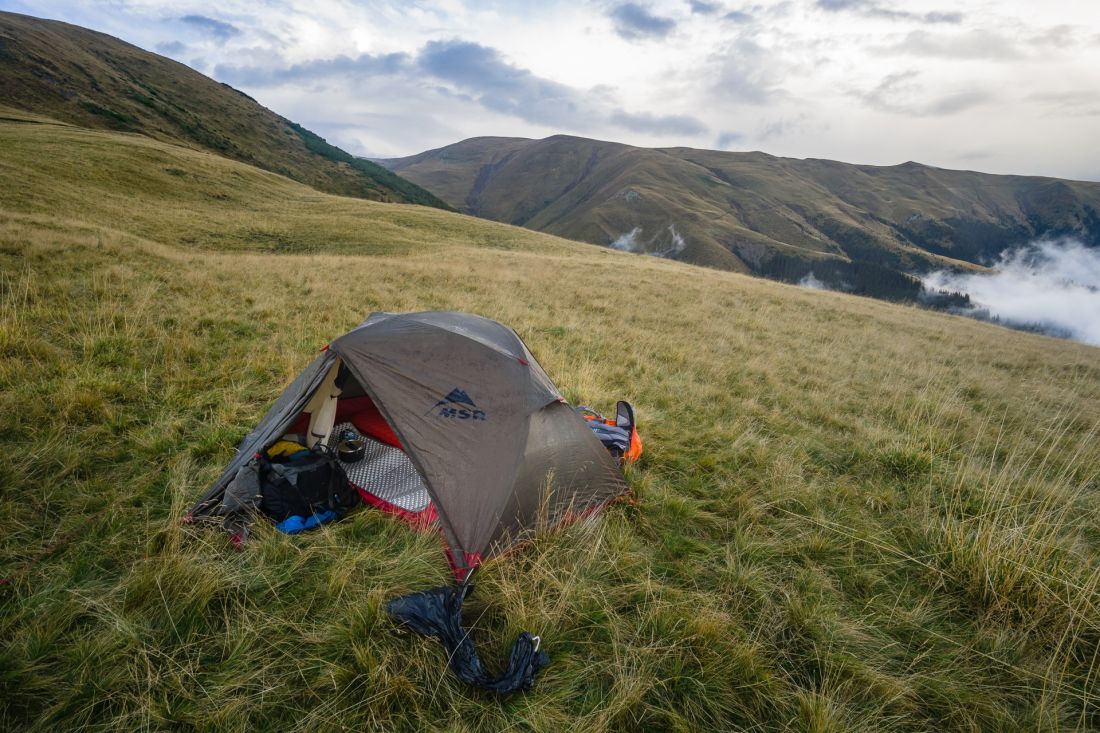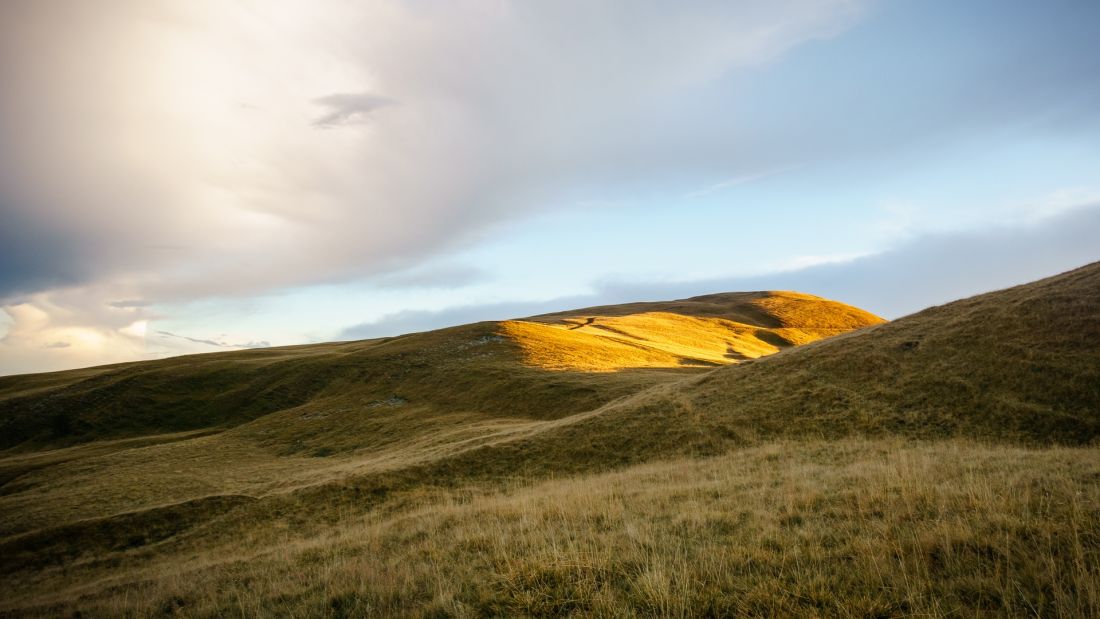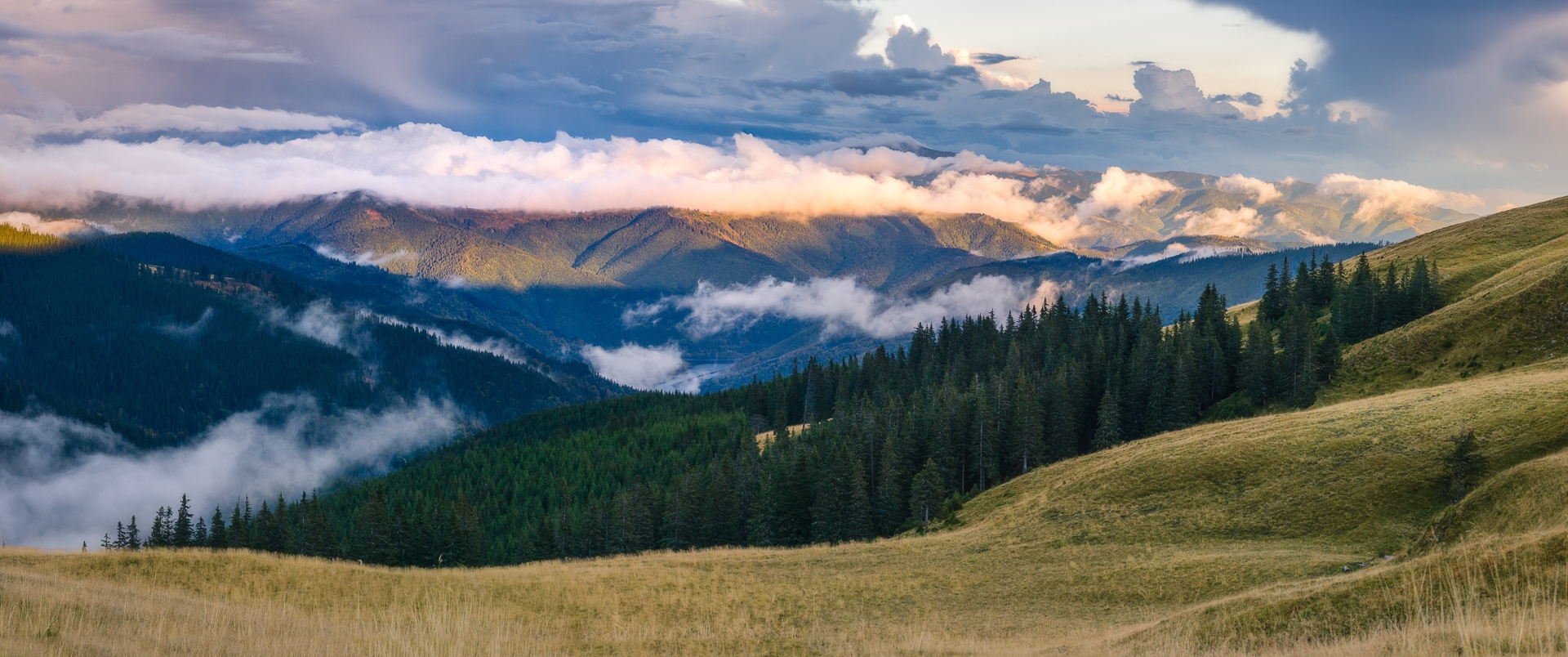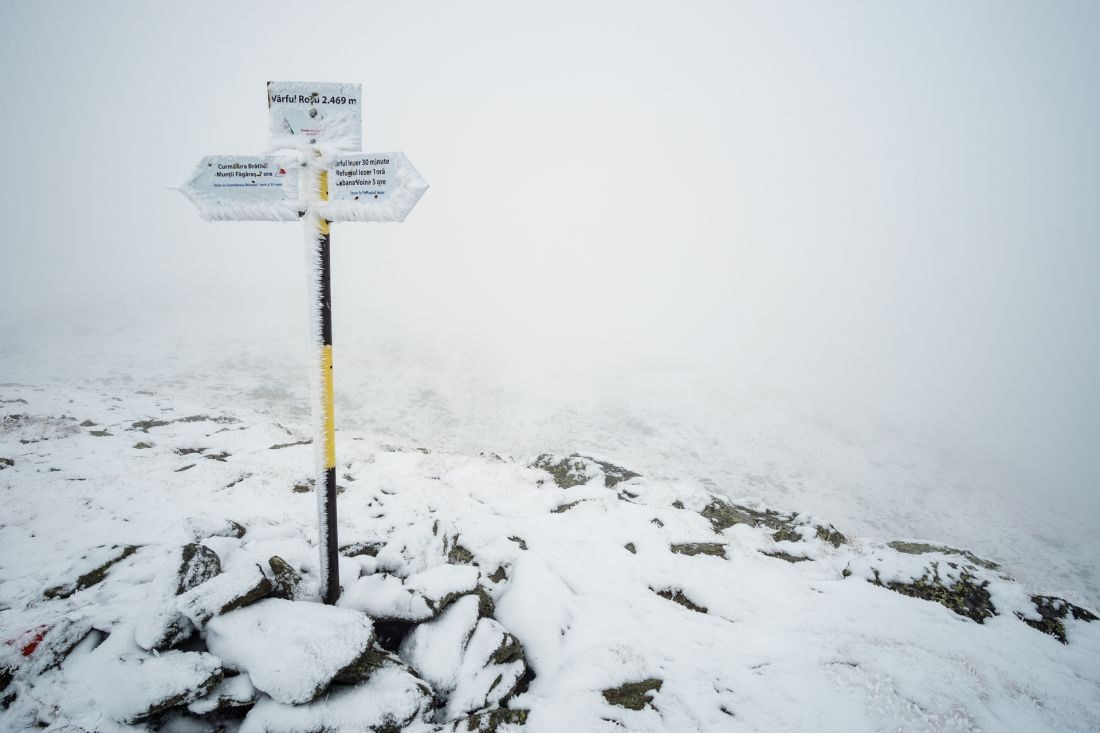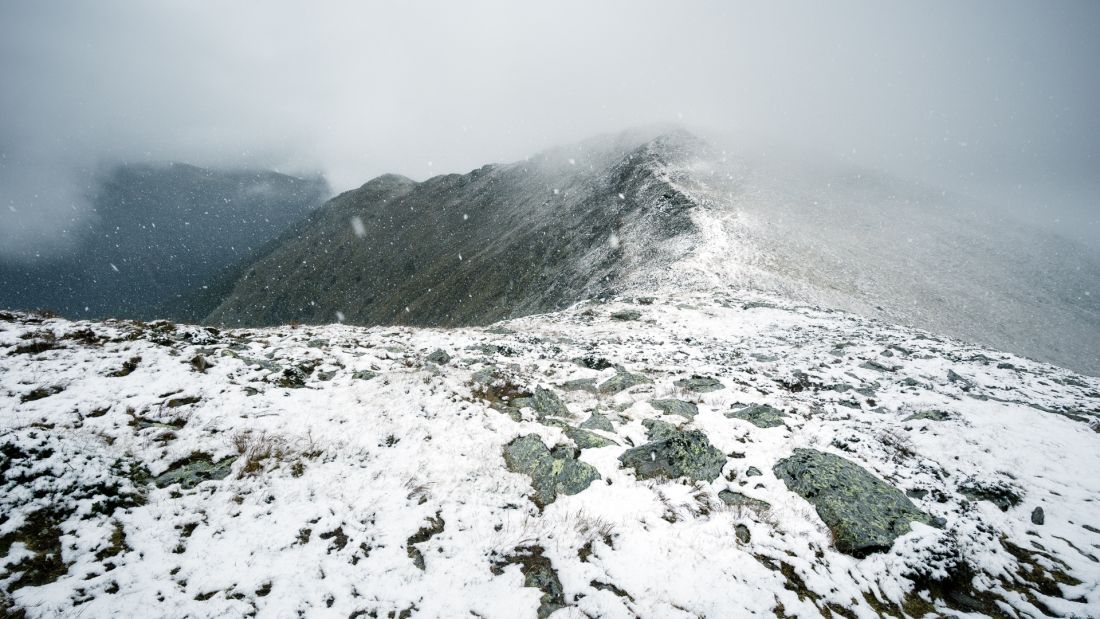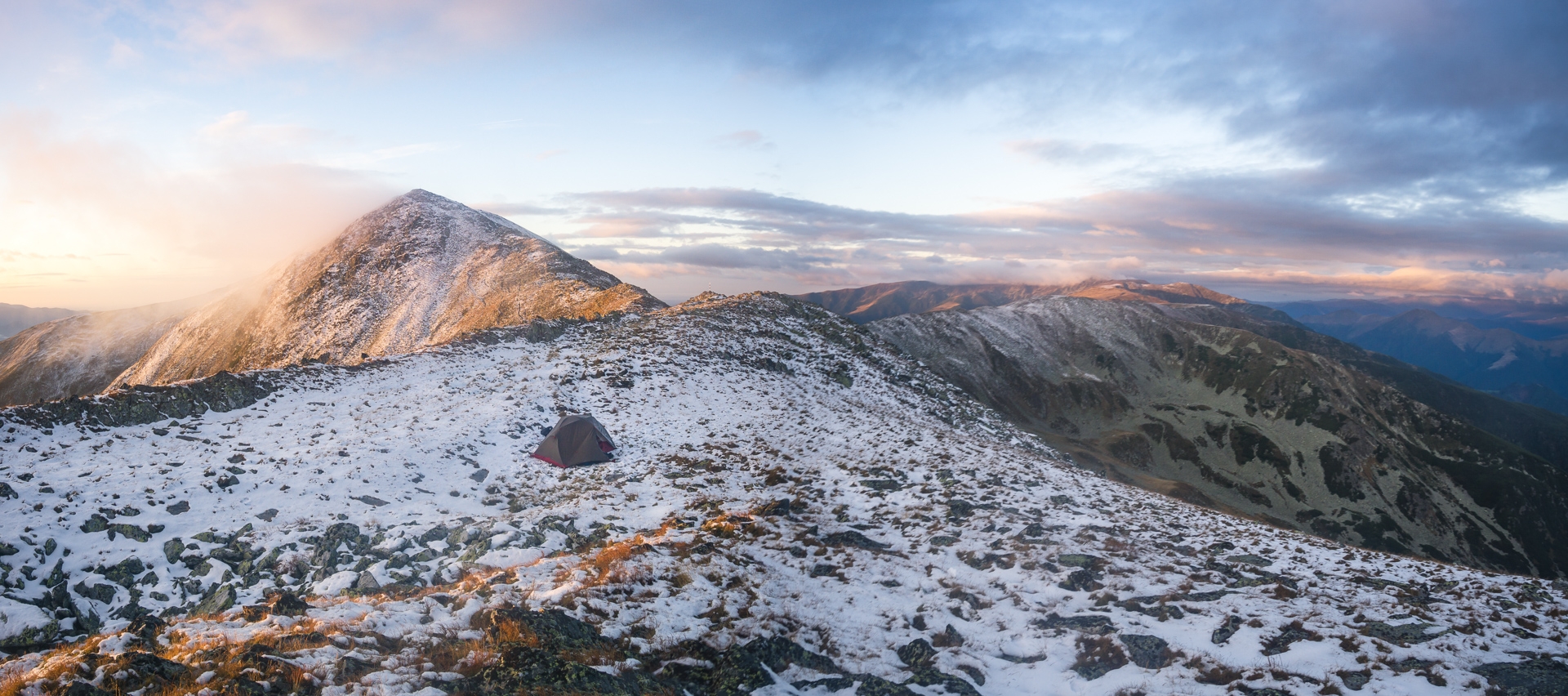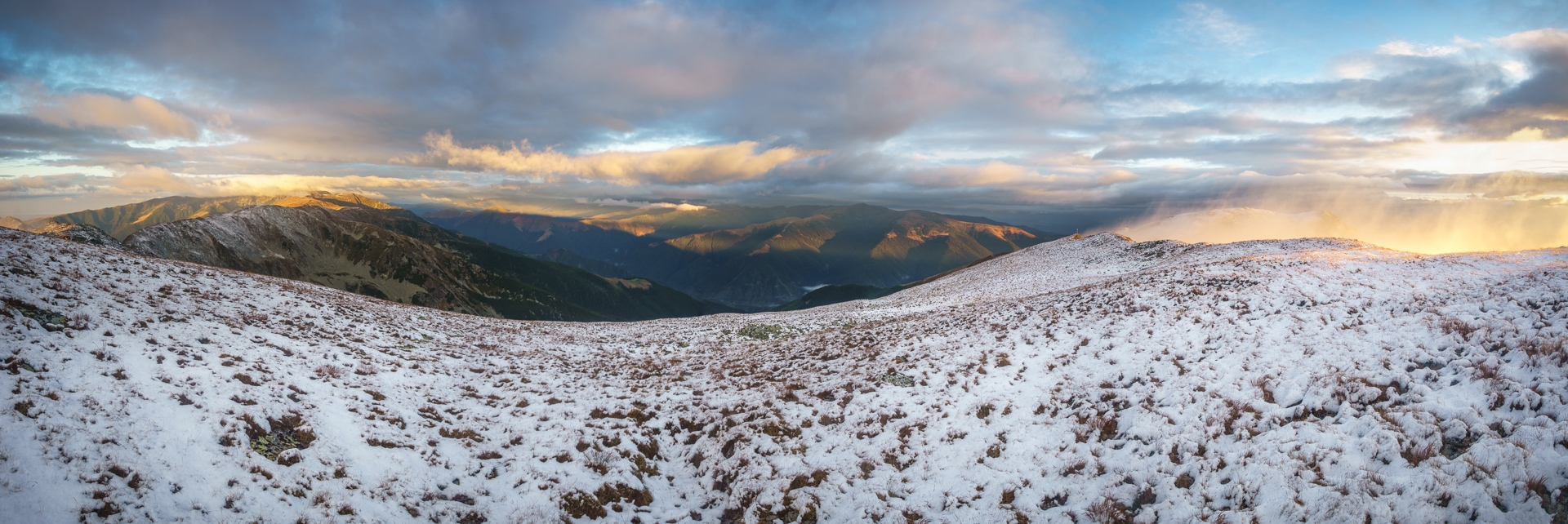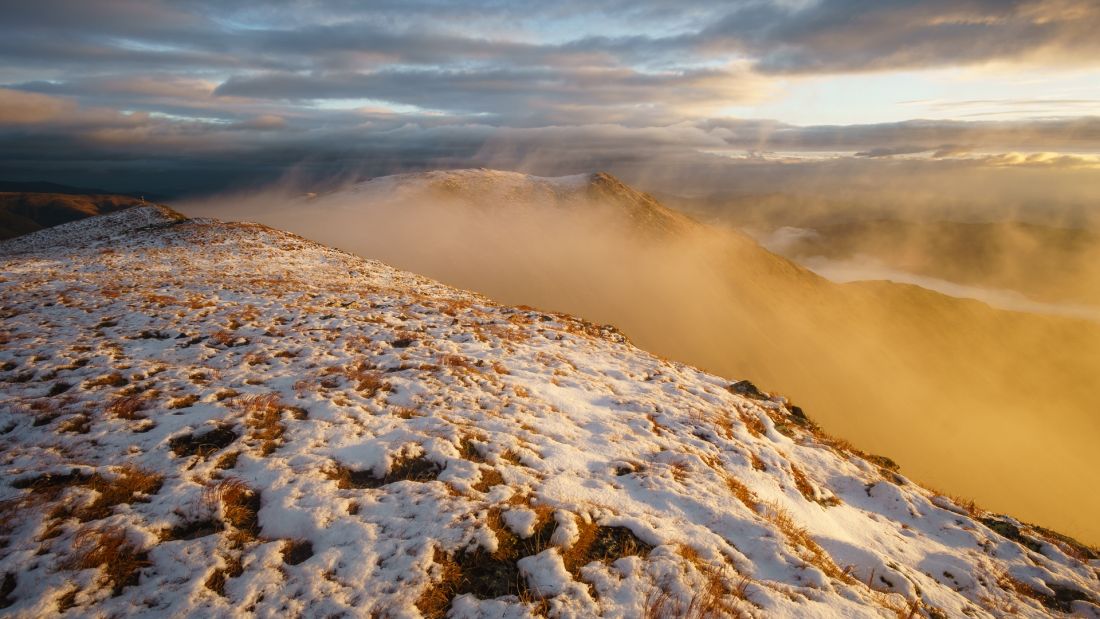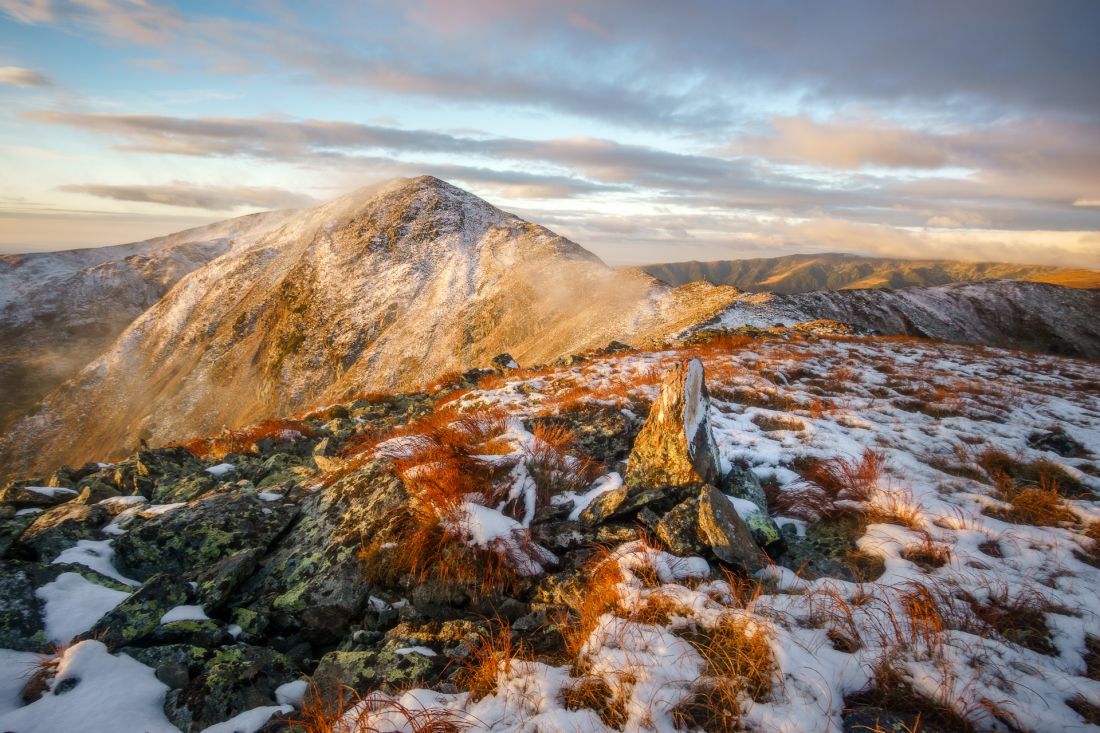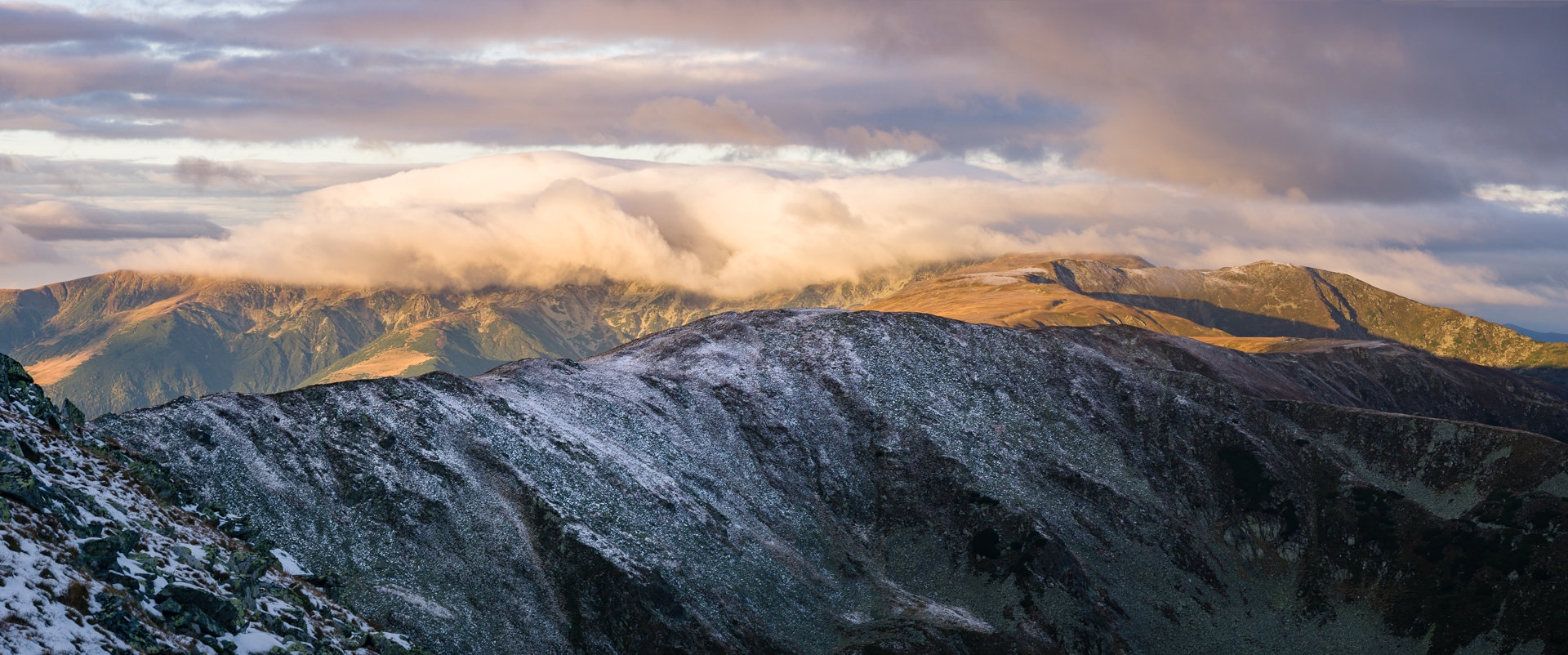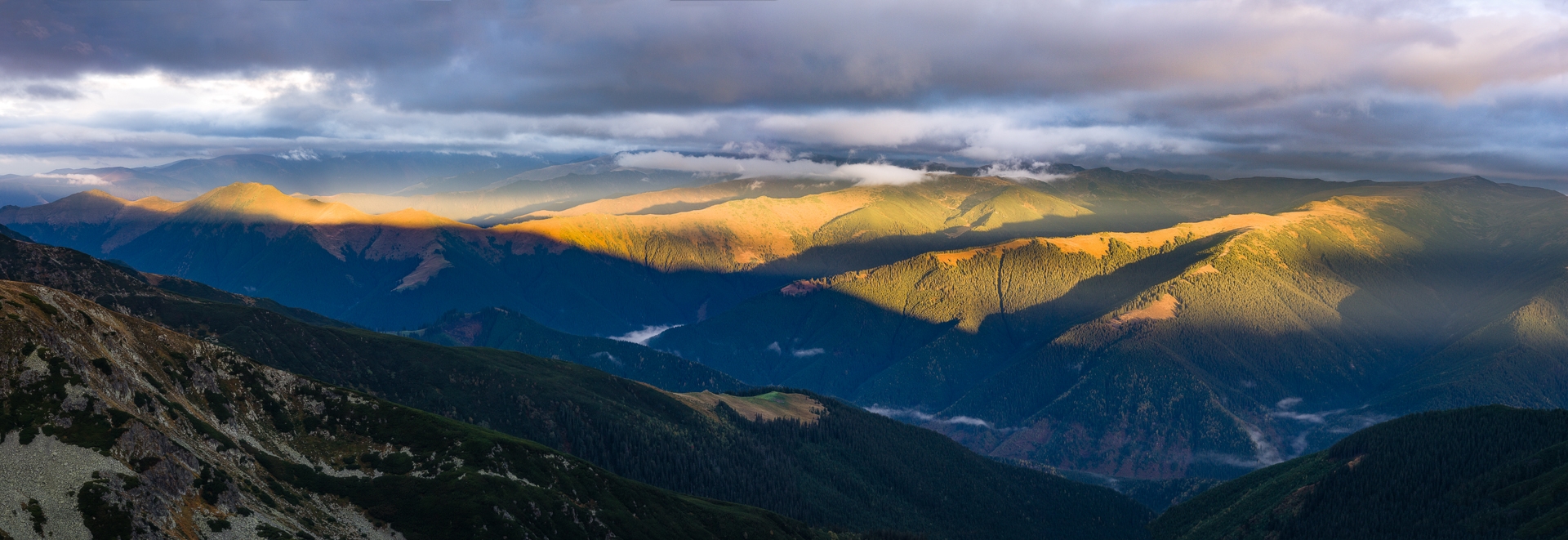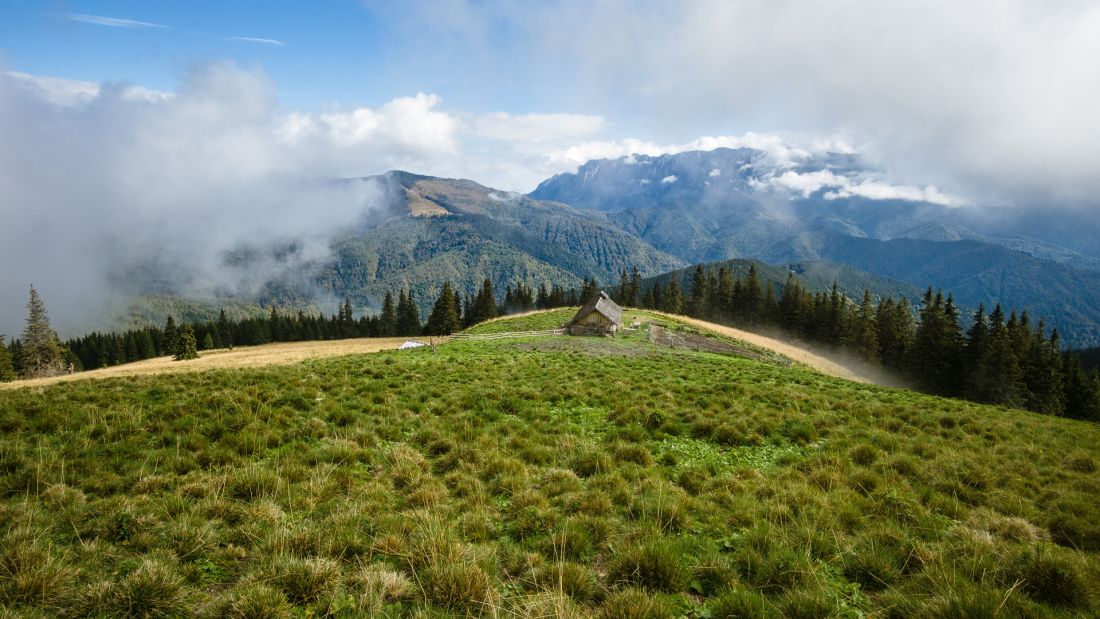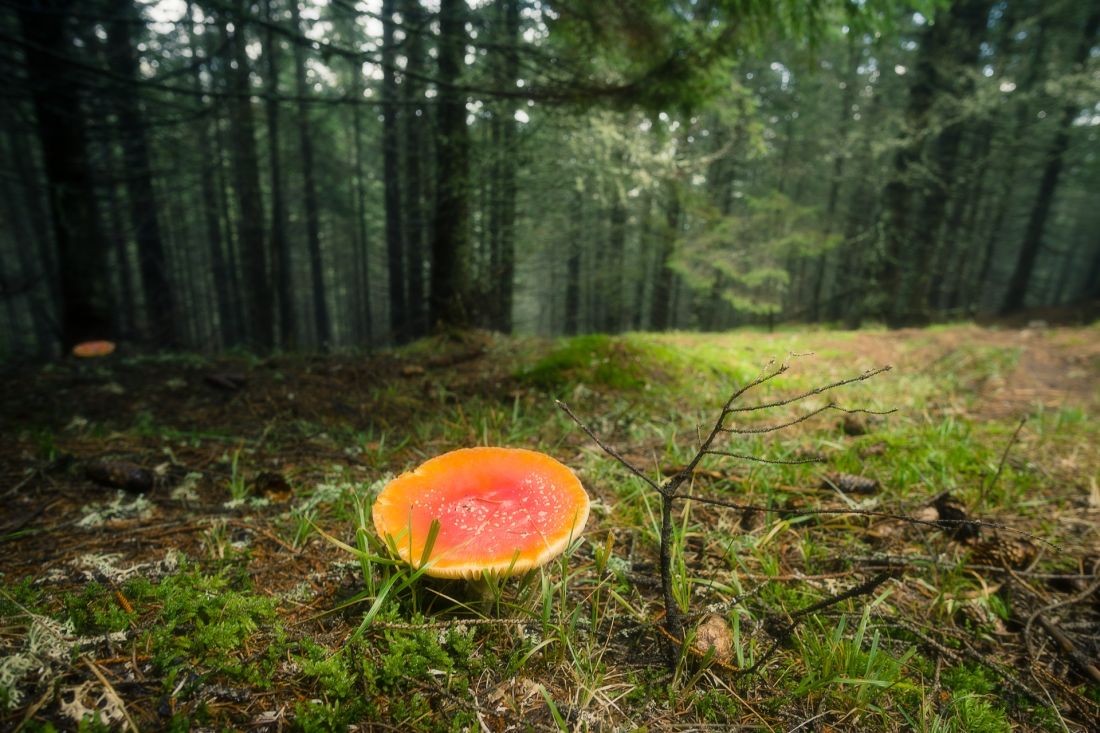Starting from Câmpulung, there are no indications that there could be relatively high mountains in the area, which are expected to be covered with snow in the next few days. Only the inconspicuous hills ripple on the horizon and autumn is only slowly beginning to colour their slopes with orange hues.
Just outside the town, we round a bend to a herd of sheep guarded by dogs, who are already watching us warily from afar. We make our way from Albești to the last settlement, Cândești, in the car of a local man who offers us a lift. He apologises for his level of English but warmly welcomes the opportunity to converse in it. We ask about the bears. After an initial misunderstanding, he replies rather laconically: "Well, they'll be in the mountains somewhere."
Beyond the last settlement, a wide road slowly rises along the river through a sparse forest. Even late in the evening, there are many lorries carrying wood, clearing away the surrounding logs. We study the map and look for a place to pitch our tent. It looks good in the area before the first steep climb. We pass a group of four hikers (the only hikers on the whole trek!) who tell us an unpleasant fact. A little higher up, they say, a log has covered the trail and it is impossible to pass - they have tried unsuccessfully themselves, which they prove with a photo. They wish us good luck and goodbye. Slowly it is getting darker and we pass only groups of woodcutters. The meeting is always suspiciously the same. We greet each other in Romanian, whereupon they begin to chatter excitedly and are only brought out of their enthusiasm by the discovery that we don't actually speak Romanian. The bravest woodcutter runs up to us, and we try to communicate in a mix of any languages we can think of together. Apparently the woodcutters don't understand why anyone would go into the mountains just like that. Eventually we get to the point each time where one of the loggers repeats "Urs! Urs!" and shows off a bear. At the same time, he persuades us to spend the night in the safety of their marquee. Whether they are genuinely worried about us we have no idea, but we continue on through the valley and pitch our tent under the trees by the river. We take the food out of the tent just in case.
When we pack up the tent in the morning, the sun is still shining through the clouds. Right at the first steep climb, however, a downpour starts and we lose the trail for the first time. We go back, search, consult the gps. When we finally find it, the rain has stopped and the trail is gaining grade. We come to the quarry we were warned about the day before. Actually, it's nothing critical, we just have to cross one fallen tree and go around the whole clearing from the left. We seem to have won until we hit another log. And then another and then another. Each time the whole situation seems more desperate, we resign ourselves to following the trail, as long as we're going uphill. In fact, we doubt there is a trail at all. Where the maps say it should be, there is nothing but a forest or a clearing.
We only reach the forest boundary late in the afternoon by crossing the last log. The meadows offer the first views of the surrounding hillsides and the dramatic dark clouds all around promise an unpleasant end of the day. Within moments, the first drops start to fall and the wind picks up. We arrive at the first saddle of Şaua Portăreasa drenched, so we decide to pitch our tent here. This decision turns out to be a very good one. Soon the sky is tearing, shreds of mist roll in the valley and the opposite hills are illuminated by the golden evening light - a little Carpathian gift.
The sun wakes us up in the morning and dries things out. Only the snow-covered top of Iezeru Mic is a visual reminder that it's actually quite cold. We climb slowly in its direction, following the main road leading further up the ridge. Somewhere in the valley below us, a dog barks. After a while I see him, he is far enough away, but again not ideally far. It's definitely barking at us. We pick up our pace, he almost catches up with us in the next saddle, but doesn't follow us any further. Maybe we've just passed his favourite ground. Looks good.
But at the point where the road undulates over rough terrain, we get a shock. A pack of dogs, estimated at 10, hard to count, a few small ones, but a few big ones, come bounding over the horizon. They bark furiously and head straight for us. Probably sheepdogs, but where the hell is the shepherd? We back up, but there is barking behind us as well, probably the former dog and another one with him. Damn, that's not good. We could be surrounded soon. We extend the tripod while still backing away. It could act as a stick that herding dogs have learned to respect. It seems to be working. They're moving slower behind us, but they're still barking. Just keep calm. We're veering off the trail and straight up the slope. The big pack is still behind us. But a few dogs seem more interested in the barking from the valley than in us. Gradually, they all move away. Ugh, that was close. We round the hill on the steep slope on the other side, just hoping that when we do, there won't be any damn semi-wild dogs waiting for us. They're not, but we can still imagine them around every other bend.
Below the summit of Obirșia we enter a layer of clouds and for the first time the snow crunches under our boots. We cross Iezeru Mic and head to the only lake (Lacul Iezer) in the mountains to replenish our water supply. Suddenly we lose 300 metres of altitude and it starts to drizzle. We look around the empty shelter, which we have read is full of clutter. This time a pleasant surprise - it is renovated, even the stove is there. We decide to stay for the night, especially as the drizzle has long since turned into a heavy snowfall. We burn coal and briquettes long into the night, drying things. Looking from the outside, the shelter looks fabulous. Just a small light in the window, just a small light in the desolate, empty and raw mountains.
It's still snowing in the morning. The snow is melting around the lake, but it is sticking around on the peaks. We climb back to the ridge, to Iezeru Mare and then to the highest point of the mountain range, the summit of Roșu. Fog and ten centimetres of snow, we have to brush the snow off the signpost to be able to read it. Yet the trail is still surprisingly easy to find and follow. We descend to the flat top of Piscanu. Hooray, the mobile signal! I take care of urgent business matters, the cold and snow only allowing a few minutes, then we must continue on. We traverse the summit of Bătrâna, saving vertical metres through open terrain compared to the trail. The snow turns to rain, but the cold remains. We need to walk at least somewhere beyond the top of Păpușa, it seems infinitely far. Everything is already wet, private ponds in our boots, we continue through heavy wet snow. At the saddle of Spintecătura Păpușii it is so bad that we expect another pack of dogs as a punctuation. But we get something completely different. In the snow around the path we find clear bear footprints. Each one is about 20 cm in length. A little further on, the footprints are confused, we find another smaller one, about 15 cm long. Both are heading in our direction. A mother with a grown cub? We make noise, reassuring ourselves that wild bears are afraid of humans (and here the bears are still wild, not used to humans). After about a hundred metres the footprints turn off the trail back into the valley. Ugh, we didn't need to see that either. Sure, the Romanian Carpathians are full of bears and everyone knows it. But at most, a few hours old tracks right on the ridge somewhat materialize their presence.
We cross the top of Păpușa and set up our tent in the first small northern saddle. There is perhaps the only place where it is possible, and it is full of softened snow and water. What can be done, we try to at least prevent more snow from falling into the inner tent. Just wait out the night and come down. Just... It's cold and damp, I'm not far from swearing. Suddenly this whole thing seems like madness, like the worst idea ever.
In the morning we get a big Carpathian gift and suddenly all this madness seems like the best idea ever. The fog has broken, but the clouds are holding dramatically over the mountains - in an absolutely perfect position to let in the first rays of the rising sun. One of the best sunrises I've experienced, definitely one to remember. To the west, the ridge of the Iezer Păpușa mountains we crossed turns golden, and beyond them, the autumn-coloured eastern Făgăraș crouches in the dark clouds. On the other side, directly beneath the rising sun, rises the giant limestone wall of Piatra Craiului.
Wild mountains all around, raw and untamed, the kind of mountains that can only be found in the Romanian Carpathians. And all this just for us, and in the best light imaginable. The red and purple tones of the first light quickly turn golden and the contrast between light and shadow on the surrounding ridges reaches a maximum. I don't even have time to think about how it is possible that we are camping in the only place far and wide that has held snow until morning. The cold is brutal, especially compared to a heated sleeping bag, but you can't just leave this place and these conditions.
We descend into the valley of the Dâmbovița River. We know that we have to descend all the way down and then cross the last saddle, the last 500 metres up and finally descend to civilization in Plaiul Foii. The grassy slopes are good to walk on, especially when the last traces of snow disappear and we eat handfuls of cranberries. Before entering the forest we stop at a perfect shepherd's hut - already empty before winter. Beyond it there is just forest, a dark Carpathian forest full of mushrooms and mysterious fog. We saw the last hiking sign at the mentioned shepherd's hut, in the forest we follow only the trail and gps. After some time, however, the two markers diverge unreasonably. Not wanting to risk a wrong path, we follow the gps and look for our "true" trail. But there is no path here. Just a forest and a 45° slope straight down, which is unpleasantly slippery. We walk the 1.5 km distance for several unreal hours. When we finally find the wide (and mostly existing) trail we were supposed to connect to, we find out what true joy in the little things looks like. Down here, we even occasionally catch a glimpse of the yellow sign we were supposed to follow.
We are walking along the valley along the river, it is 5 o'clock in the evening and the last saddle is still ahead of us. It should be fine. It's not. The yellow marker bakes us out a second time. There's no marked trail to the saddle. Just impenetrable forest, a steep creek and not a scrap of hope. Damn, bivouacking in the middle of a dense Romanian forest is not a good idea. We examine the map. We see an alternative roughly twice as long on an unmarked and, according to the map, wide path. Yes, that will do. It has to. We find the path easily, but it's definitely not wide. I mean, it might have been once, but now it's lost in the thicket. We're picking our way through thick branches and over fallen logs. Gps is working almost constantly. We're turning on our headlamps, and we're not even a third of the way up. The trail doubles, we take a wrong turn, we come back. It's going so damn slow, damn it.
From one side we hear the distant sounds of a chainsaw in the valley, from the other side the barking of dogs. Occasionally a branch snaps, a deer bugles. Horror made in Romania with no vampires needed. The higher up we go, this nocturnal movement seems more and more like a bad idea. We pray that there is at least a marked path at the top continuing over the ridge to the original saddle. The forest thins and we find the path. The first sign, the second, then even a signpost. Yes! At least the eastern descent from Făgăraș is marked properly. We don't reach the huts on Plaiul Foii until sometime before midnight. Suddenly civilisation, cars, loud shouting. Maybe too much civilisation? We pitch our tent on a private meadow off to the side. More out of habit, we carry out the bags of food and waste a few metres from the tent.
The morning sun is shining, but the valley hides in shadow. A chill rises from the river. And the garbage bag is nowhere to be found. A fox? We leave the road towards Zărnești, hitchhiking. The first car stops...
















